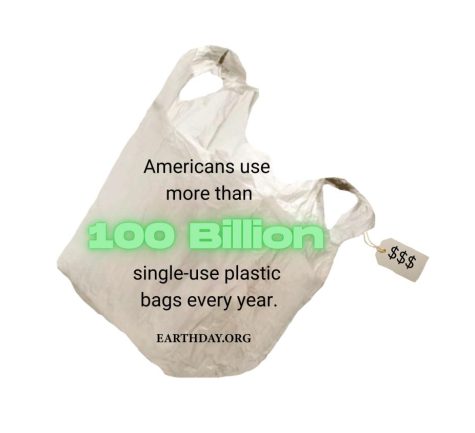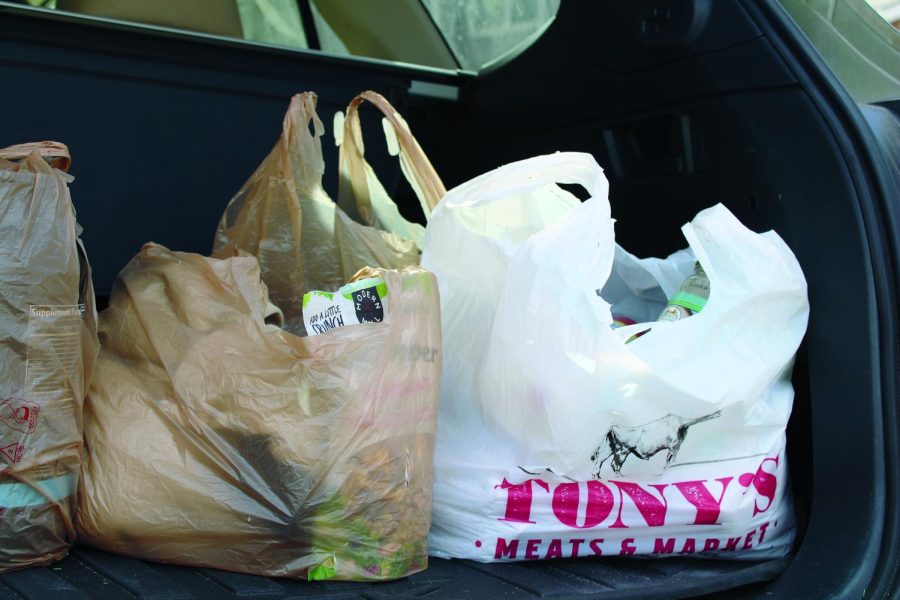Shoppers Pay for Plastic Under New Bag Law
A new Colorado law puts a small fee on disposable plastic bags and will completely eliminate them in 2024. “Plastic is really an egregious offender in climate change, both in the production and in disposal,” Colorado Senator Lisa Cutter said. The bill’s sponsors hope that their bill will positively affect Colorado’s environment and encourage more people to buy reusable bags.
March 12, 2023
Plastic bags are everywhere. In household closets, in grocery store checkout lines, and blowing in the wind on streets and sidewalks. Now, the Colorado legislature is mounting an attack to eliminate plastic bags and their environmental impact.
Colorado’s congress passed a bill that came into effect at the beginning of 2023 that imposes a ten cent fee on all plastic and paper carryout bags. In 2024, plastic bags are planned to be completely eliminated from stores and restaurants. Alongside plastic bags, expanded polystyrene, or Styrofoam, will also be prohibited.
Other states, in recent years, have implemented similar bans on carryout plastic bags, starting with California in 2014.
Colorado Senator Lisa Cutter is a prime sponsor of the bill. She and representative Alex Valdez proposed the bill in 2021. It was signed in August 2021, but it took two years to finally go into effect.
“That bill involved a lot of people [like] environmental activists and advocates,” Cutter said. “So we worked with them to develop legislation. We looked at model legislation and what other states and cities were doing that was effective.”
Cutter and her colleagues who sponsored the bill are hoping that less plastic bags in landfills will have a positive impact on Colorado’s ecosystems.
“Plastic is really an egregious offender in climate change, both in the production and in disposal,” Cutter said. “We can’t get rid of all plastic, there’s some good plastic that is suitable for, say, medical devices.”
According to Cutter, plastic isn’t just a problem for the environment. “[Plastic products] don’t break down in landfills. They’re not recyclable,” Cutter said.
“It’s bad for the environment on so many levels but it’s also a problem for human health. Do you know that we eat about a credit card worth of plastic every week?”
While it may have long lasting effects for the environment, Creek’s community has a different perspective on the bill. Many businesses in Belleview Square, like King Soopers, use plastic bags and styrofoam containers for carryout.
“Bubble wrap and general packing materials that are made out of these items like plastic and Styrofoam are common,” freshman Devin Reid said. “Finding an alternative for them that is not as easy to mass produce might be a problem.”

Reid is doubtful of the bill’s environmental impact. He believes that the bill won’t make a real difference until 2024, when plastic bags are completely banned. “I’m not entirely sure if it will help the environment as much as someone might think,” Reid said. “I am aware of a couple of studies that California has done about the impact after they banned plastic bags from stores and finding that it has little effect on waste output.”
Students now have two options: they can pay the tax everytime they go to the store, or they can buy reusable grocery bags. King Soopers now sells canvas bags at less than a dollar each to encourage more people to buy them.
“I think this is definitely helping the environment because the number of bags used for packaging will decrease the longer this initiative is in effect,” senior Francesca Bolastig said. “While it can be slightly inconvenient for some people, they will eventually get used to bringing their own reusable bags, which will help reduce overall plastic use. I started bringing my own a few weeks ago.”
Reusable canvas grocery bags will become much more common for each Colorado citizen as shoppers will strive to save money and prevent hassle. At the new discounted price, canvas bags are a good option for many. For those who already used reusable bags before the bill, like science teacher Lauren Sutton, the bill doesn’t affect them as much.
“As a science teacher I always think it’s good to reduce waste as much as possible so in that respect I think it is positive,” Sutton said. “I use Styrofoam cups and other Styrofoam containers for certain labs that we perform so that will be a bit difficult and I will need to find an alternative.”
The bill’s sponsors hope that this law will help eliminate one of the largest forces of pollution and climate change, especially with the changes that will come into effect at the beginning of 2024.
“If stores actually stick to this and plastic bags are banned by 2024, I’m sure many of us will be used to bringing our [reusable] bags by then,” Bolastig said. “I see no problem with it continuing because this is a step forward in ensuring that our communities contribute to positive changes in our environment.”



![Vice President Kamala Harris visited Arvada on Monday to discuss the Biden Administration’s climate policies with U.S. Representative Brittany Pettersen and rock climber Sasha DiGiulian. “When you combine what we have accomplished with the Inflation Reduction Act, together with the CHIPS [and Science] Act and the bipartisan infrastructure law, we’re looking at about $1 trillion that will hit the streets of America,” Harris said. “And what an impact we can have, to really fast-forward what is long overdue on a number of issues…what we’ll do around greenhouse gas emissions, what we will do in our water policy.”](https://unionstreetjournal.com/wp-content/uploads/2023/03/IMG_7227-300x200.jpg)





















